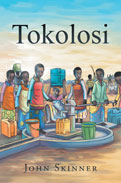
 |
Six-year-old Tsabo Mashedi lives in the fictional African village of Katama. He is a traditional “herd boy” who watches over the family livestock while his mother and siblings do nearly all the rest of the work. Typically, fathers would do little more than talk and decide, but Tsabo’s father is not typical. He has a job as a policeman, but when he realizes Tsabo’s potential, he takes a better-paid job as a miner so that his son can go to the mission school and then to university. Tsabo excels beyond his greatest expectations, winning a scholarship to Oxford University. His four years in England, instructed and mentored by Dermot McCausland (the book’s narrator) will lead to a successful career as a lawyer—though with many stops on the way.
Returning to Africa after graduation to help the family when his father becomes ill, Tsabo reunites with English acquaintance Harry Burke who has come to Katama under the aegis of the United Nations to assist with dire conditions after a two-year-long drought in the region. Tsabo meanwhile has taken a job with the UN, so the two begin working together. But even with the best will and highest hopes, it is harder than they could have imagined to help Katama. Corruption is found at every level, from the money-grabbing tribal officials to the donors from foreign lands who bask in the luxury of their exalted positions. AIDS is on the rise, and missionaries have their own agenda for what is best for Africans. It seems at times as though the region is indeed infested with what the indigenous people call “tokolosi”—invisible dwarves whose mischief keeps Kataman people suspicious, separated, and mired in needless insufficiency.
Skinner has composed a remarkable debut novel. His previous work for the United Nations in Africa undoubtedly informed this composition, which ranges from the heady atmosphere of Oxford’s elites to the simplest huts and most needy denizens of sub-Saharan Africa. For this effort, he has created a fictional but believable African language and culture and combined various materials such as young Tsabo’s poignant recollections of his first day at the mission school, a large helping of insider terminology shared among diplomats and aid workers, and some pertinent family details. Women are also part of the story, notably Tsabo’s supportive English wife and a kindly nun who oversees Tsabo’s early education.
To construct this complex saga, Skinner has invoked a credible setting—Katama with its ambiance of sorcery, poverty, oppression, and self-defeating skepticism regarding the help offered by outsiders. With various insurrections and international plots afoot, Skinner reveals an entire continent beset by intrigue, giving his central characters a role in that action. His book is highly readable on several levels. There are the private lives and personal strivings of the main characters, including the special connections between Tsabo, Harry, their wives and families, and Harry’s cousin Dermot who leads a double life. Dermot’s intrigues provide the next level: international spy-vs.-spy machinations that always accompany strife within and among nations. Perhaps the most compelling level of interest to a wide audience is offered in the author’s portrayal of African life—as it has been, as it has gradually been developing, and as it could be at its best—as seen through the vision of people like Tsabo Mashedi.
RECOMMENDED by the US Review